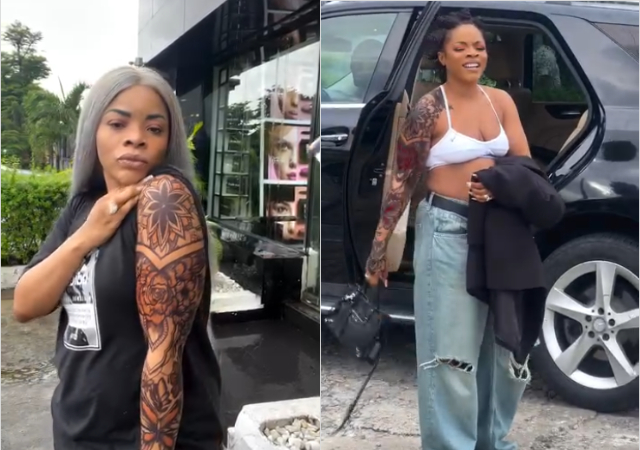Nigerian influencer and reality TV star Laura Ikeji-Kanu has unveiled a striking new arm tattoo, sparking a heated debate about societal expectations, motherhood, and personal expression. The reveal, which came through a video posted on her social media accounts, has drawn both admiration and criticism, highlighting the complex interplay between celebrity culture, traditional values, and evolving norms in Nigerian society.
Laura Ikeji-Kanu, known for her vibrant presence on social media and her stint on the “Real Housewives of Lagos,” chose a daring approach to showcase her latest body art. In the video that quickly went viral, Ikeji-Kanu is seen confidently strutting towards her car, clad in a bra and baggy jeans that perfectly frame her new tattoo. The casual yet provocative ensemble ensured that all eyes were drawn to the intricate design adorning her arm.
The influencer’s choice of attire, coupled with her nonchalant demeanor – laughing and swinging her handbag as she walked – seemed to underscore a message of self-assurance and defiance against conventional expectations. This bold statement of personal style and body autonomy quickly became the talk of the town, igniting discussions across various social media platforms.
As with any controversial move by a public figure, reactions to Laura Ikeji-Kanu’s new tattoo and her method of revealing it have been diverse and passionate. The comments section of her post became a battleground of conflicting opinions, reflecting the broader societal tensions between traditional values and modern expressions of individuality.
Some followers expressed discomfort with what they perceived as an overly revealing outfit for a married woman and mother. Comments like “@mimiogedengbe: “Interesting? As a mum, this is what’s trendy now right?” and “@anigboroejiroghene: “If mothers are coming out naked what would children do now?” highlight the persistent societal expectations placed on women, particularly mothers, to adhere to more conservative standards of dress and behavior.
Others took issue with the tattoo itself, questioning the necessity and appropriateness of such body art for someone in Ikeji-Kanu’s position. The criticism ranged from mild disapproval to more harsh judgments, with some commenters going as far as to compare her appearance to that of a “drug dealer.
However, amidst the criticism, there were also voices of support and admiration. Some fans praised Ikeji-Kanu for her confidence and her right to express herself freely, regardless of her status as a wife and mother. These supporters argued that personal style and body modifications like tattoos are individual choices that should not be subject to public scrutiny or judgment.
In a move that has intrigued many observers, Laura Ikeji-Kanu’s response to the controversy has been both surprising and strategic. Rather than directly confronting her critics or doubling down on her initial statement, she took an unexpected turn that has left many wondering about her true intentions.
In a follow-up post, Ikeji-Kanu shared that she had come to the conclusion that “a married woman and mother shouldn’t sport a full arm tattoo.” This apparent backtracking raised eyebrows among her followers, with some questioning the sincerity of her change of heart.
However, the plot thickened when Ikeji-Kanu revealed her solution to this self-imposed dilemma: she promptly covered the tattoo using foundation from her own beauty line, Laura Beauty Africa. This swift pivot from controversy to product promotion has not gone unnoticed by her audience, with many speculating that the entire episode might have been a calculated marketing ploy.
The introduction of Laura Beauty Africa foundation as a solution to cover the tattoo has added another layer to this unfolding drama. Some observers have praised Ikeji-Kanu for her business acumen, noting how she managed to turn a potentially damaging controversy into a marketing opportunity for her brand.
This move has sparked discussions about the nature of influencer marketing and the blurred lines between personal expression and brand promotion in the age of social media. It raises questions about authenticity and the extent to which public figures curate their image and controversies for commercial gain.
As the dust settles on this controversy, it’s clear that the implications extend far beyond a simple tattoo reveal. Laura Ikeji-Kanu’s actions and the public’s reactions have sparked important conversations about personal freedom, societal expectations, and the evolving nature of public personas in the digital age.
Whether this incident will lead to any lasting changes in how Nigerian society views self-expression, particularly for women and mothers, remains to be seen. What’s certain is that it has provided ample food for thought for anyone interested in the intersection of celebrity culture, social media, and societal norms in contemporary Nigeria.
As Laura Ikeji-Kanu continues to navigate the choppy waters of public opinion, her actions will undoubtedly be watched closely by fans, critics, and industry observers alike. In an era where personal branding and public image are increasingly intertwined, this episode serves as a fascinating case study in the power of controversy, the complexities of public perception, and the ever-shifting landscape of social media influence.



